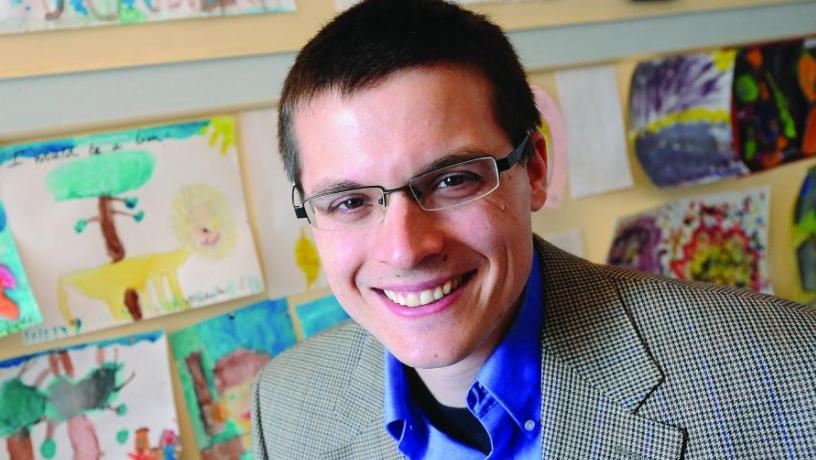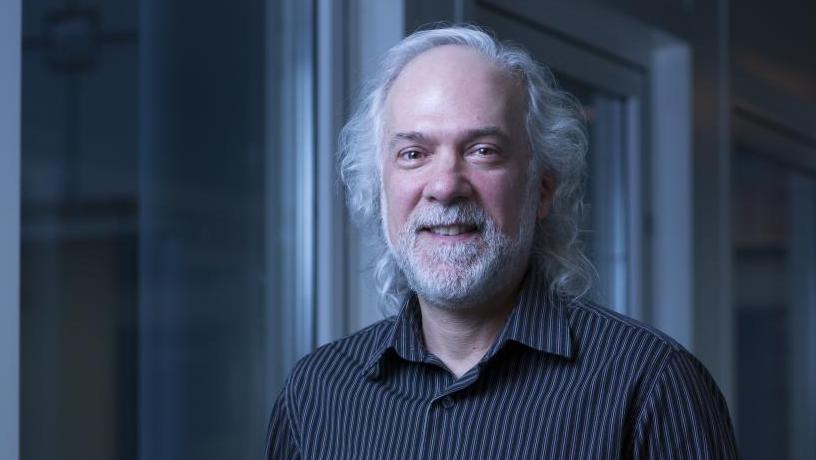Making the Grade: Servedio, Vallancourt Win Presidential Teaching Awards
Rocco Servedio, associate professor of computer science, and David Vallancourt, senior lecturer in electrical engineering, have been awarded Columbia’s Presidential Teaching Award, a top teaching honor given by the University to just five recipients each year at Commencement. Established in 1996, the presidential awards recognize the best of Columbia’s teachers “for the influence they have on the development of their students and their part in maintaining the University’s longstanding reputation for educational excellence.”

Rocco Servedio

David Vallancourt
Both Servedio and Vallancourt will join the faculty procession at the University Commencement Ceremony held May 22.
“We are extremely proud that Rocco and David have been honored this year by the University for their outstanding teaching,” said Donald Goldfarb, interim dean of Columbia Engineering. “SEAS has two of the five awardees this year, which really underscores the great strength of our faculty and their commitment to teaching.”
Servedio and Vallancourt were surprised to hear the news.
“I was thrilled,” says Servedio. “There are so many tremendously dedicated and skilled teachers at Columbia, all across the different schools of the University, that it was really very meaningful to get this recognition.”
As teachers, both aim to keep it interesting. Their teaching styles differ but they agree it is key to be able to engage the students in the material and help them really understand it.
Vallancourt, who teaches the first-year engineering course in electrical engineering, has been credited for keeping the lectures fresh, fun, and full of interesting demonstrations. “One of my main tools is making connections between course material and common devices with which students are familiar,” says Vallancourt, who has in the past dissected everything from smartphones to electric guitars in class. “This gives me the opportunity to tear things apart on ‘company time,’ and what engineer wouldn’t enjoy that?”
Servedio aims for a relaxed classroom style “with a heavy emphasis on making sure that students first have a solid intuitive and conceptual grasp of the material before getting into mathematical details.”
Servedio teaches an introductory course in computational learning theory and it is important to him to try to explain the material clearly and convincingly so that students understand why it is interesting and worthwhile. “A lecture is a lot like a story, and if a story doesn’t make sense on a ‘gut level’ then there is no way a listener is going to care enough to absorb the details.”
A leading computational theorist, Servedio joined Columbia Engineering from Harvard where he was an NSF mathematical sciences postdoc in the University’s Division of Engineering and Applied Sciences. He studied at Harvard, earning his AB in mathematics and both his MS and PhD in computer science. Servedio’s research focuses mainly on computational learning theory as well as computational complexity theory, cryptography, and quantum computation.
Vallancourt, who is also an alumnus of Columbia Engineering, having earned his bachelor’s, master’s, and PhD here all in electrical engineering, joined the School in 1987 as an assistant professor. In 1992, he left Columbia for AT&T Bell Labs (later Lucent Technologies) where he served on the technical staff until 2000. Before returning to Morningside in 2005 as a senior lecturer in Circuits and Systems in the Department of Electrical Engineering, he worked at Texas Instruments and Vitesse Semiconductor.
This is not the first time Vallancourt has been honored for exemplary teaching. In 2007, he received a Distinguished Faculty Teaching Award, which is presented annually on Class Day by the Columbia Engineering Alumni Association. What makes him a good teacher? “I try to lower the perceived wall between ‘faculty’ and ‘student’,” he says, “and to be friendly and helpful as my teachers and industry mentors have been. I don’t make students follow a lot of rules, and instead, encourage them to focus on the engineering.”
For Vallancourt, the reward of teaching is a two-way street. “Chatting with students is a blast. I’ve met some really cool people who might not normally hang out with an old white-haired guy.”
Servedio and Vallancourt join five Engineering professors who have won the Presidential Teaching Award in the past. This list of outstanding educators includes Patricia Culligan, professor of civil engineering and engineering mechanics; George Deodatis, Santiago and Robertina Calatrava Family Professor of Civil Engineering and Engineering Mechanics; George Flynn, Higgins Professor of Chemistry and professor of chemical engineering; Yannis Tsividis, Charles Batchelor Professor of Electrical Engineering; and the late Nicholas Turro, William P. Schweitzer Professor of Chemistry and former co-chair of chemical engineering.
